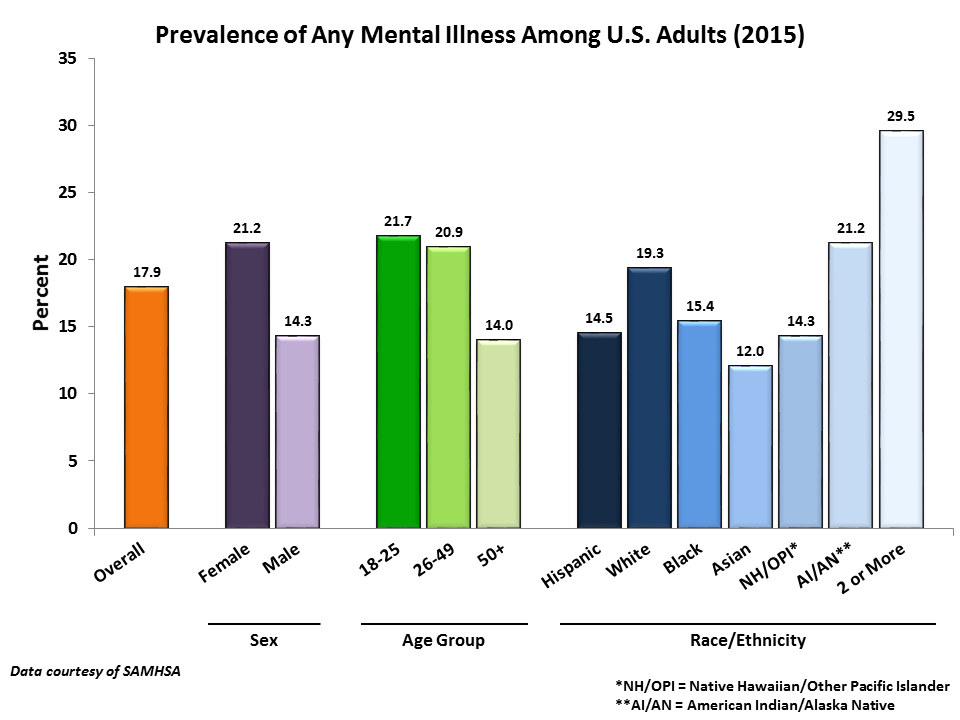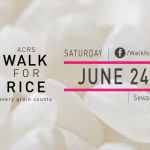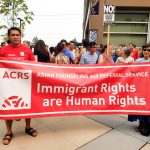What is Culturally Competent Mental Health Care?
By Helen Hammer, Development Intern
Earlier this summer, Governor Jay Inslee declared that July 2017 would be recognized as Mental Health Awareness in Communities of Color Month. It’s another moment that ACRS is proud to be a part of Washington State.Mental health care is an indispensable part of life for many Washingtonians, and for many Asian American and Pacific Islander (AAPI) individuals, it is a substantial challenge to find culturally competent care.
According to the National Institute of Mental Health, there were over 43 million adults (18 years or older) with “any mental illness” in the U.S. in 2015, which represents 17.9% of all U.S. adults. The table below from the Substance Abuse and Mental Health Services Administration (SAMHSA), a branch of the U.S. Department of Health and Human Services, breaks this figure down by gender, age, and race/ethnicity in the figure below.
What does “any mental illness” mean? According to SAMHSA, any mental illness (AMI) could be a mental, behavioral, or emotional disorder. This definition does not include developmental or substance abuse disorders. Further, the AMI category includes disorders that range from no impairment on the individual’s life to severely debilitating impact. There’s a separate category of “serious mental illness” (SMI), which includes about 9.8 million U.S. adults (4% of the 18 and over population) in 2015. A 2014-2015 estimate from SAMHSA indicates that there are more than a million adults in Washington State who are living with AMI and about 239,000 others struggling with SMI.
With the defeat of the U.S. Senate’s recent attempts to repeal the Affordable Care Act (ACA or “Obamacare”), insurance coverage for mental health and substance use disorder services are safe for the time being, as they are part of a provision that guarantees coverage for a set of essential health benefits. Still, there is much evidence showing that inequities persist for members of the AAPI population when it comes to accessing healthcare. For example, in 2011 it was reported that older Asian American women had the highest suicide rates of all women over age 65 in the U.S. Among women ages 15-24, Asian Americans have the highest suicide mortality rates across all racial/ethnic groups. These statistics are distressing. Whether we are researching the numbers at the state level or nationally, we’ve seen that access to culturally competent mental health care can be life changing.
What does it mean to provide culturally competent services? And how does ACRS serve an historically overlooked and extremely diverse population?
At ACRS, culturally competent care is delivered by providers with the expertise, experience and knowledge to effectively integrate history, client worldviews, values, beliefs, and attitudes towards behavioral health and substance use. Providing such care requires providers who are sufficiently educated, experienced and committed to the same goal. ACRS believes that every individual has the right to culturally competent care, and because of this value, ACRS relies on the financial support of government dollars to assist us in executing this mission. In addition to hiring the necessary workforce, serving communities of color requires additional staffing, increased training and supervision of staff by organizational leaders who are themselves trained in and committed to cultural competency and linguistic accessibility.
I sat down with ACRS’ behavioral health program director, Yoon Joo Han and asked her to elaborate on what culturally competent care looks like for an exceedingly diverse client population. She explained to me that ACRS delivers a multicultural, multilingual model of care that is at the foundation of our approach to client well-being. “ACRS staff relies on their client’s knowledge of and equal partnership in the treatment process,” she says. ACRS’ behavioral health staff speak approximately 20 languages between them and there are around 35 bilingual case managers. All of the individual services conducted by case managers are conducted in the client’s language. Yoon Joo notes that there is a scarcity of trained staff to provide the multilingual and multicultural model that ACRS strives for. “It’s becoming harder and harder. There is a lot of competition for talent and there is a rarity of multilingual staff. Fewer and fewer individuals are joining the profession because it is not one that is well respected in society.” This reminds us that the Governor’s proclamation is as relevant today as ever. Dedicating July to an awareness of mental health within communities of color is exceedingly important considering the prevalence of mental disorders today.
ACRS remains committed to helping clients meet their goals through culturally competent care. For one middle-aged Cambodian client, this has meant that he has progressed successfully through his recovery journey enough to become a peer specialist. ACRS recruits and trains peer specialists to support fellow clients who may share their language, or refugee or immigration experience. This man was exposed to horrific tragedy in Cambodia before coming to the U.S. as a refugee when he was a teenager. Once he arrived in the U.S., he struggled with additional challenges such as poverty and discrimination, all while suffering from symptoms of mental distress. He did not receive the medical care necessary to address his health and found himself in legal trouble. He reached a point where he didn’t care if he lived or died. He was eventually referred to ACRS and began to work with a Cambodian case manager. What ensued was a relationship built on trust and mutual understanding. “Clients should feel proud of their heritage,” says Yoon Joo, “and matching this client with a case manager who was able to relate to his experience in Cambodia and offer culturally appropriate treatment options was pivotal to his recovery.”
ACRS is committed to helping clients continue on their journeys of recovery and health. Whatever cultural background an individual identifies with, it should be the mission of every social service provider to connect the client in the most culturally and linguistically competent care possible. Do you know somebody who can benefit from speaking with one of our care providers? Please have them reach out to us at (206) 695-7600.







